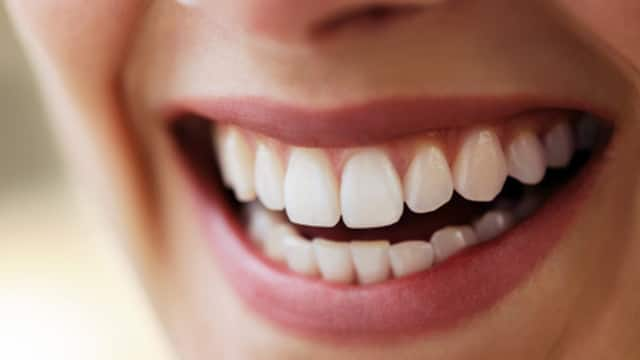Symptoms of Gum Sensitivity
Even if you’re someone who pays careful attention to your oral health, you may find yourself asking why you’re experiencing sensitive gums. Sore gums can result from underlying medical conditions or be the result of more benign causes, like irritation from your mouthguard.
The most common cause of gum sensitivity is gum disease (also known as periodontal disease). Gum disease is a serious condition that can lead to tooth loss if left untreated, so it’s vital to practice proper dental hygiene and schedule a visit with your dental professional if you have symptoms.
Gum sensitivity can be caused by other behaviours or conditions beyond just gum disease, so we’re here to walk you through a few you might not expect.
1. Brushing Too Hard
If you brush too vigorously, you may be irritating your gums or wearing down your enamel, leading to gum sensitivity.
You’re doing a great job by putting energy into your oral care routine, but it’s a good idea to treat your mouth with care. The technique is more important than force when it comes to your dental health because your teeth and gums are more sensitive than you might expect.
Helpful tips if you brush too hard:
- Brush gently for two minutes twice daily by holding your toothbrush at a 45-degree angle and cleaning all surfaces of your teeth
- The Indian Dental Association advises to replace your toothbrush every three or four months, or sooner if the bristles become frayed. A worn toothbrush will not do a good job of cleaning your teeth.
- Select a toothbrush with a strong grip so you can use controlled movements
- Choose a non-abrasive toothpaste with fluoride.
- Clean in between your teeth once daily using a flossing device
2. Hormonal Changes
According to the IOSR Journal of Dental and Medical Sciences, the increased level of progesterone causes bacteria to grow as well as make gum tissues more sensitive to plaque causes gingivitis.
Hormonal events that can trigger gum sensitivity include:
- Puberty
- Taking birth control
- Menstrual cycle
- Pregnancy
- Menopause
Helpful tip: Those with high levels of estrogen or progesterone are more likely to develop gum disease. If you're in this category, it’s especially important to practice a proper dental routine and schedule regular visits with your dental professional.
3. Irritation From Food or Dental Appliance
A common cause of sensitive gums is irritation from your diet or a dental appliance. Your mouth is adaptive and susceptible to environmental changes, much like other parts of your body. If you introduce a dental appliance or regularly consume unhealthy foods or drinks, it could cause a reaction in your oral health.
Gum Sensitivity From Food
If you consume too many acidic or sugary foods or beverages, it could inflame your gums or cause discomfort. For this reason, it’s a smart choice to eat a healthy diet to avoid the problem in the first place. Some items that you might not consider unhealthy may be acidic, like meals with tomatoes or drinks with lemon.
Tips for caring for sensitive gums from a poor diet:
- Limit or avoid sugary or acidic foods and drinks
- Rinse your mouth with water or mouthwash after consuming a sugary or acidic item
- Chew sugar-free gum or consume dairy products as both stimulate healthy saliva production
- Eat meals instead of over-snacking to help limit the damage from acid or sugar.
- Brush your teeth for two minutes twice daily and clean between your teeth with a flossing device once daily
In addition to causing temporary sensitivity or discomfort, acidic and sugary items can increase your chance of developing gum disease. Practice proper dental care and schedule regular appointments with your dental professional if you believe your diet has caused gingivitis or periodontitis.
Gum Sensitivity From Your Dental Appliance
Your gums may be experiencing sensitivity because of your braces, retainer, mouth-guard, dentures, or other fixed or removable appliances. If you have a new appliance, rest easy knowing that it can take some time to get used to it.
If you find that your dental appliance has been damaged, worn down, or is causing continued irritation to your mouth, it’s a great idea to schedule an appointment with a dental professional. They can adjust your appliance or recommend a replacement that won’t cause discomfort or pain.
It can be hard to tell if your gum sensitivity comes from gingivitis, periodontitis, or another condition. It’s vital to not only address your gum sensitivity but to treat its underlying cause to ensure it doesn’t progress. You've done an excellent job preparing yourself for success with an understanding of some surprising causes of gum sensitivity.
This article is intended to promote understanding of and knowledge about general oral health topics. It is not intended to be a substitute for professional advice, diagnosis or treatment. Always seek the advice of your dentist or other qualified healthcare provider with any questions you may have regarding a medical condition or treatment.
ORAL HEALTH QUIZ
What's behind your smile?
Take our Oral Health assessment to get the most from your oral care routine
ORAL HEALTH QUIZ
What's behind your smile?
Take our Oral Health assessment to get the most from your oral care routine











